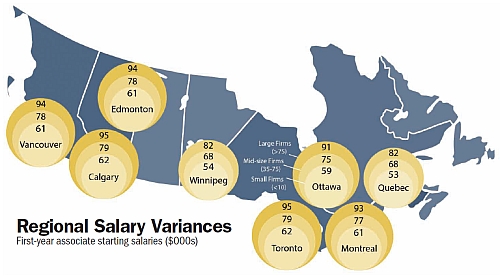Anyone with their finger on the pulse of the legal job market will be used to hearing words like cutting back and slimming down. But some legal recruiters say the news is not nearly as grim as you might assume at the articling student and junior associate end of things.
“What I am seeing over the next 12 to 14 months is rapid growth in terms of the number of jobs,” says Gene Roberts, director of Robert Half’s legal recruitment division in Toronto. “I think we are going to see job growth of between 3 per cent and 5 per cent, largely driven by litigation and corporate-law practice areas — mergers and acquisitions, corporate securities and areas like that.”
While firms are hiring, he says, they are taking a more strategic approach to whom they bring on board, looking beyond academic achievement.
“What they’re looking at now is a person’s level of critical thinking, their problem-solving skills, how well they work within a team. They’ll also want to know whether you have done anything besides just your law-school training. Have you enrolled in continuing legal education programs? What have you done to really help your career going forward?”
According to the Robert Half 2015 Legal Salary Guide, corporate firms are interested in mid-level associates right now. They’re looking for qualifications to help them grow revenue in specialized areas like litigation, corporate law and commercial real estate. That creates more room at the junior end, says Roberts, because “as the mid-level associates are starting to move up, there’s a lot of creation of new positions and new areas for you to jump into.”
Not everyone is as optimistic. Whitney Borins, a consultant with RainMaker Group, says prospects for recent grads and junior levels lawyers “aren’t as good as they once were, but they’re not bad.”
The high-demand areas? She, too, says commercial real estate, “which has had a 20-year run. Competition just got busy again – although it tends to be more cartel than corporate – so firms will probably be looking for more juniors there. Niche areas always remain busy, so energy and infrastructure are two more areas that are hot.”
Carrie Heller, president and founder of the Heller Group Legal and Executive Search, would add tax and insolvency to the list. Heller says while recruiters are seeing an uptick in overall demand – especially at larger firms, which did very little hiring in the years after the 2008 financial crisis – the recovery is not as robust at the junior levels because firms are doing more outsourcing and using technology to keep client costs down. “If you look at 2007 versus today, the major firms certainly bring on fewer students to that kind of work,” she says.
As for hire-backs, the numbers for the past three years appear to have remained stable in the high 70-per-cent level. But Christopher Sweeney, the CEO of ZSA Legal Recruitment, says that’s not indicative of the number of new jobs firms are creating. “What we’re hearing is, the number of students being taken by each firm is decreasing, but hire-back rates are remaining constant. So it’s a bit deceptive to say a firm is hiring back 90 per cent of its students — they’re just hiring fewer students. And I see that only continuing.
“I think the number of articling students firms will take will decrease over the coming years. I think the marketplace is in definite contraction.”
Sweeney says recent graduates and articling students who want to up their chances might want to look for a position in Vancouver, which seems to be heating up, and avoid putting all their hopes in Calgary or Montréal, which have slowed down in terms of growth. “For law firms, the great recession continues. But we’re still getting demand for in-house positions, even at the junior end. Maybe people should increasingly be looking to in-house once they finish articling.”
“What I am seeing over the next 12 to 14 months is rapid growth in terms of the number of jobs,” says Gene Roberts, director of Robert Half’s legal recruitment division in Toronto. “I think we are going to see job growth of between 3 per cent and 5 per cent, largely driven by litigation and corporate-law practice areas — mergers and acquisitions, corporate securities and areas like that.”
While firms are hiring, he says, they are taking a more strategic approach to whom they bring on board, looking beyond academic achievement.
“What they’re looking at now is a person’s level of critical thinking, their problem-solving skills, how well they work within a team. They’ll also want to know whether you have done anything besides just your law-school training. Have you enrolled in continuing legal education programs? What have you done to really help your career going forward?”
According to the Robert Half 2015 Legal Salary Guide, corporate firms are interested in mid-level associates right now. They’re looking for qualifications to help them grow revenue in specialized areas like litigation, corporate law and commercial real estate. That creates more room at the junior end, says Roberts, because “as the mid-level associates are starting to move up, there’s a lot of creation of new positions and new areas for you to jump into.”
Not everyone is as optimistic. Whitney Borins, a consultant with RainMaker Group, says prospects for recent grads and junior levels lawyers “aren’t as good as they once were, but they’re not bad.”
The high-demand areas? She, too, says commercial real estate, “which has had a 20-year run. Competition just got busy again – although it tends to be more cartel than corporate – so firms will probably be looking for more juniors there. Niche areas always remain busy, so energy and infrastructure are two more areas that are hot.”
Carrie Heller, president and founder of the Heller Group Legal and Executive Search, would add tax and insolvency to the list. Heller says while recruiters are seeing an uptick in overall demand – especially at larger firms, which did very little hiring in the years after the 2008 financial crisis – the recovery is not as robust at the junior levels because firms are doing more outsourcing and using technology to keep client costs down. “If you look at 2007 versus today, the major firms certainly bring on fewer students to that kind of work,” she says.
As for hire-backs, the numbers for the past three years appear to have remained stable in the high 70-per-cent level. But Christopher Sweeney, the CEO of ZSA Legal Recruitment, says that’s not indicative of the number of new jobs firms are creating. “What we’re hearing is, the number of students being taken by each firm is decreasing, but hire-back rates are remaining constant. So it’s a bit deceptive to say a firm is hiring back 90 per cent of its students — they’re just hiring fewer students. And I see that only continuing.
“I think the number of articling students firms will take will decrease over the coming years. I think the marketplace is in definite contraction.”
Sweeney says recent graduates and articling students who want to up their chances might want to look for a position in Vancouver, which seems to be heating up, and avoid putting all their hopes in Calgary or Montréal, which have slowed down in terms of growth. “For law firms, the great recession continues. But we’re still getting demand for in-house positions, even at the junior end. Maybe people should increasingly be looking to in-house once they finish articling.”





